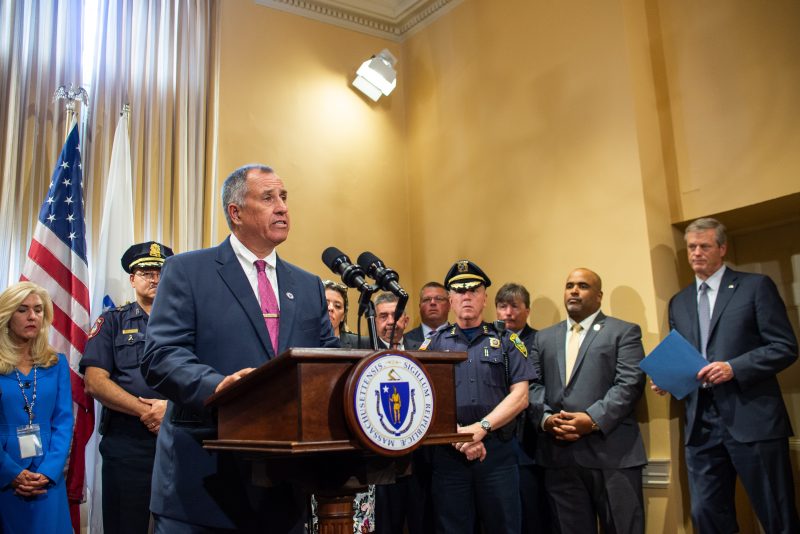Community
Supreme Court: Some inmates seeking release due to COVID-19 will be allowed to receive hearing

The Massachusetts Supreme Judicial Court today issued its ruling on an emergency petition filed by the Committee for Public Counsel Services (CPCS) and the Massachusetts Association of Criminal Defense Lawyers (MACDL), which sought to immediately release thousands of inmates held on bail and those sentenced over concerns of COVID-19 in jails and prisons in the Commonwealth.
People who are held pretrial on bail and have not been found dangerous or charged with a violent or otherwise excluded offense are entitled to a hearing within two business days of filing their motions, where they will be entitled to a rebuttable presumption of release.
The Court ordered the state Department of Correction and each sheriff to provide daily reports on the number of COVID-19 tests and number of positive results for all people in their custody, correctional officers, and other staff, and the number of people released pursuant to the Court’s procedures and guidance. The Court also urged the parole board to expedite the hearings of individuals who are eligible for parole.
The Court expressed its view that the system should endeavor to reduce numbers of detainees in light of COVID-19, but that should be done with consideration of public safety, victims’ rights, and the challenges inmates will face upon release.
Hampden District Attorney Anthony D. Gulluni stated, “We are very appreciative of today’s decision by the Supreme Judicial Court. The Court’s decision contemplates the seriousness of this crisis for all involved, including victims of crime, our communities, and the health of inmates across the Commonwealth. This decision will allow us to continue thoughtful and careful individual reviews of detainees that has and will continue to reduce inmate populations, without jeopardizing victims of crime or our citizens across the Commonwealth.”
District Attorneys Blodgett, Cruz, Early, Gulluni, Morrissey, O’Keefe, and Quinn argued in their brief filed with the Court and in oral arguments that the Supreme Judicial Court’s powers, particularly on sentenced inmates, was limited due to the Separation of Powers. The District Attorneys also argued that the wholesale release of thousands of pre-trial and sentenced inmates would violate victims’ rights and seriously endanger public safety across the Commonwealth. The seven DAs further emphasized that this proposed spontaneous release would not only endanger crime victims and the public, but also the very inmates being released. In this state of emergency, those released would not benefit from the bevy of after-incarceration services typically provided, including medical and substance use care, and would not be supervised by agencies like parole or probation, which provide critical resources and guidance to men and women who re-enter our society after months and years of incarceration. Instead, the District Attorneys preferred that inmates be considered for release on a case-by-case basis in hearings before judges, who can make individual decisions considering the totality of the circumstances.
“We are glad that this decision affords some relief for pretrial detainees, as well as important reporting requirements,” said Matthew Segal, legal director at the ACLU of Massachusetts. “But we believe it falls short of what is necessary to prevent more illness and death among people in custody, correctional staff members, and the broader community. We urge every branch of Massachusetts government to do what it can to save the lives of people inside Massachusetts detention facilities, and in so doing to keep all of us safer.”
“We are pleased that the Court has taken steps to help some individuals being held prior to trial advocate for their release expeditiously,” said Anthony Benedetti, chief counsel for CPCS. “The SJC clearly recognizes the urgency of the pandemic’s rapid spread and has directed the sheriffs and the Department of Correction to provide daily reports on how COVID-19 is affecting their institutions. The Court has made clear that the Executive Branch has the authority to address the danger facing all those currently serving sentences, and we urge the Governor to utilize that power to help prevent a potentially deadly outbreak. Meanwhile, public defenders and defense attorneys across the state will continue to do everything in our power to get people out from behind the wall and save lives.”
“While it is somewhat helpful that the SJC has recognized that the COVID-19 pandemic constitutes a changed circumstance for pretrial detainees held in Massachusetts and that a handful of such detainees are entitled to a presumption of release, MACDL is gravely concerned that the Court rejected our request to provide a path to safety for every one of these human beings who have been found not dangerous and are presumed innocent of the charges they face,” said Victoria Kelleher, president of MACDL. “Equally concerning, the SJC rejected the argument that the COVID-19 pandemic provides any basis to secure the release of any convicted criminal defendants. Instead, the SJC invited these prisoners to return to Court if and when the COVID-19 pandemic spreads sufficiently in our prisons and jails to raise Eighth Amendment concerns of ‘cruel and unusual punishment.’ Of course, at that point, it will be too late for many prisoners. History will determine whether the SJC’s decision amounts to justice or a tragic missed opportunity to save vulnerable people and a horrible stain on the record of the oldest supreme court in the world.”
Last week, the three organizations filed an emergency petition asking the Supreme Judicial Court to take immediate action to limit outbreaks of COVID-19 by reducing the number of people who are incarcerated in Massachusetts jails, prisons, and houses of correction.
At least eight other state and local court systems—in Alabama, Maine, Montana, New Jersey, Ohio, South Carolina, Texas, and Washington—as well as the District of Columbia, have taken steps to limit incarceration during the pandemic.
Bristol County District Attorney Thomas Quinn issued the following statement on the ruling.
“We are very pleased the court rejected the request by the ACLU and CPCS for the mass release of thousands of inmates.”
“I’m very appreciative that the SJC agreed with our position that each case will be considered on its own merits. I’m also heartened that the court did not order the release of the many dangerous defendants held in custody for violent crimes or major drug trafficking.”
“During the past three weeks, our office has been handling many motions to release defendants on a case by case basis. We will continue to strongly oppose the release of dangerous defendants to protect the public and victims.”
“During the past three weeks the population at the Bristol County jail has decreased by 20% due to the decrease in new arrests and the release of defendants that the court does not consider a public safety risk.”
“Under the court ruling, we will be required to review cases of certain defendants that the court does not consider a threat to public safety. However, we still have the right to request that defendants already in custody, who pose a clear threat to public safety or are a clear flight risk, continue to be held.”
-

 Community7 years ago
Community7 years agoNational Shrine of La Salette Festival of Lights 2017 set to begin
-

 Community6 years ago
Community6 years agoMassachusetts State Police looking for good home for retired dogs
-

 Crime6 years ago
Crime6 years agoFall River ranked most dangerous city in Massachusetts according to report
-

 latest7 years ago
latest7 years agoDurfee student allegedly overdoses on marijuana
-

 Community6 years ago
Community6 years agoVideo of Fall River Police goes viral
-

 Causes6 years ago
Causes6 years agoMissing Fall River woman found deceased
-

 Crime7 years ago
Crime7 years agoFall River Police add names to most wanted list
-

 Causes6 years ago
Causes6 years agoFall River teenager reported missing has been found




You must be logged in to post a comment Login